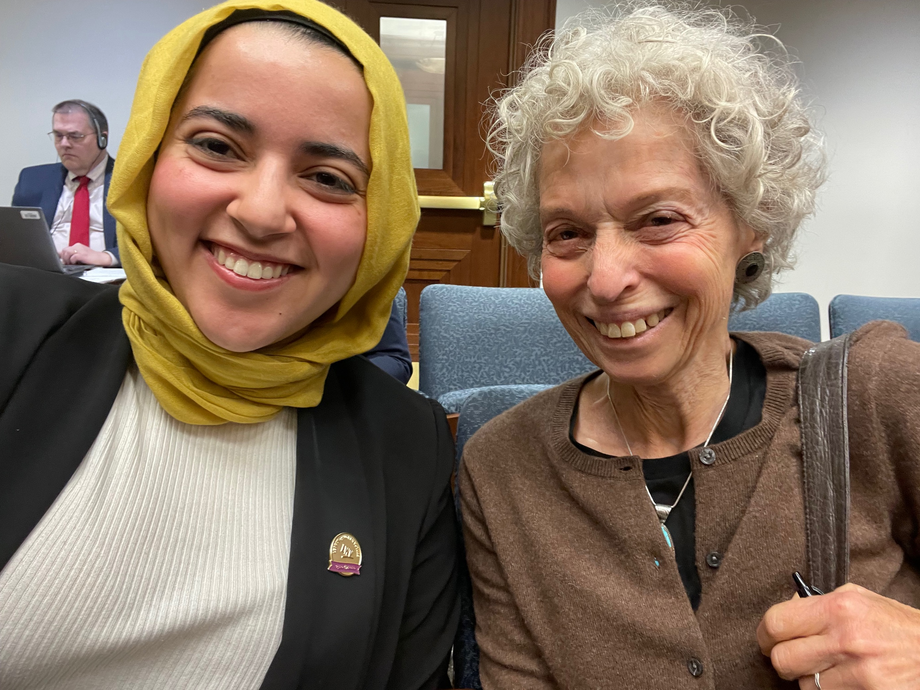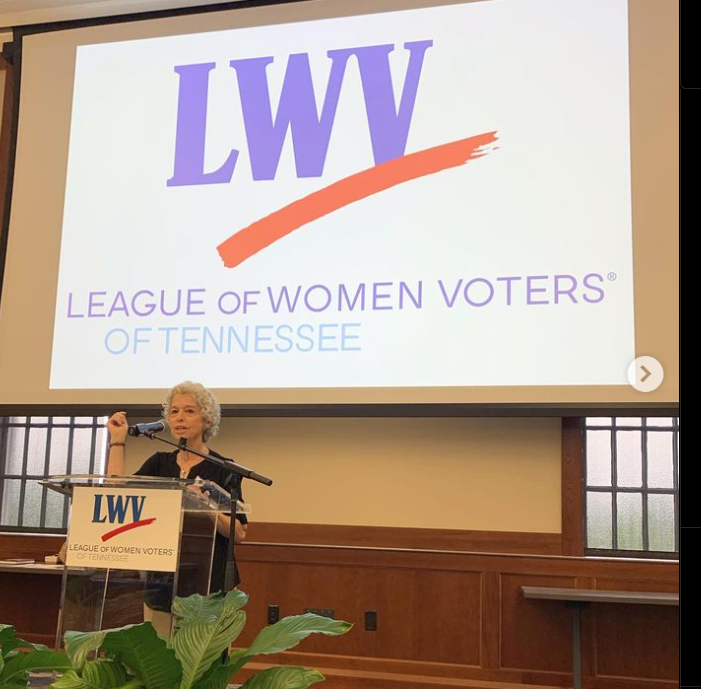I’ve visited the Tennessee State Legislature in many capacities throughout my life in Nashville. In high school, I was a delegate alongside other students across the state participating in the YMCA’s Youth in Government Program. As a college student, I sat in the House gallery and watched the governor’s State of the State address alongside other Tennesseans protesting the newly instituted Muslim ban. In 2018, I was in the Cordell Hull Building lobbying with a refugee rights organization against a bill that would make Tennessee less hospitable to immigrants and refugees. I showed up in that building as a civic-minded student, protestor, and concerned citizen.
As a legislative and policy coordinator at the League of Women Voters of the US (LWVUS), one of my chief roles is to support state Leagues in the legislative and advocacy efforts. In March, the League of Women Voters of Tennessee's state president, Debby Gould, asked to reschedule our monthly check-in because she would attend a committee hearing at Cordell Hull. I happened to be working remotely from Nashville that day, so I joined her. At a quarter to noon, we filed into the House Elections and Campaign Finance subcommittee room, where a litany of election bills would be heard. Debby carried a sheet with several bills starred — one was particularly gnarly: HB0169, a bill that would effectively give voting rights to limited liability corporations (LLCs) in city elections.
“Isn’t that ridiculous?” Debby chuckled. It certainly was, because corporations don’t vote, people do.
,

The author, Khadija Ali Amghaiab, and LWVTN President Debby Gould
,
As we waited for the hearing to begin, Debby noted who the representatives were and which parts of the state they represented. The chairman called the hearing to order. A few bills about proposed convenience voting centers were heard, and a nurse and some concerned women testified against them. A representative asked clarifying questions, and when the people testifying seemed muddled in their testimony, they explained the difference between early voting centers and convenience centers. Debby wasn’t concerned whether these bills would pass the subcommittee, nor were the other elected officials in the room. We jotted notes to each other, and Debby explained that in rural counties, people relied on these convenience vote centers. A grandson could pick up his grandmother in a separate district, head to a convenience center, and vote there together.
Although Tennessee was the only place I’d ever voted in, I didn’t know about these centers and how they made voting more accessible. Further, I’d assumed what I always challenge others not to assume: that because Tennessee is such a deep red state, any bill that made voting easier would be sure to die in the legislature. HB0632 proved my assumption wrong, as do other voting norms in Tennessee’s voting laws. We have two weeks of early voting before any statewide and federal election, including Saturdays. We have open primaries, although the system was challenged during the 2023 legislative session. And now, I learned that we had these convenience centers, which made voting accessible to folks living in rural areas of the state.
,
Advocate in your community by joining your state or local League!
,
Unfortunately, there are still many ways Tennessee restricts voter access, like requiring an ID at the polls, or making it difficult to get an absentee ballot. Or finding novel ways to inflate votes in a district, like in the case of HB0169, a bill to effectively grant LLCs voting rights in city elections.
HB0169 was up next on the docket. Representative Wright introduced it and added an amendment. The committee chairman asked if anyone was testifying for or against this bill. There was no one. I turned to Debby; she shrugged. A vote was called. There were no “ayes,” but rather, a bench of unanimous “nays.” The bill died.
After a few more bills, the committee adjourned, and Debby and I headed out. She stopped to chat with a demographer about a bill that had just passed, requiring the review and verification of addresses after redistricting. Davidson County’s congressional maps had been badly gerrymandered on political lines in 2022, splitting the county into three other districts which largely comprise rural areas of the state. Despite LWVTN’s active efforts in mobilizing people around redistricting last year, the state House and Senate maps were also badly gerrymandered on partisan lines, and both maps were challenged in the courts.
,

,
We left the legislative building and walked to lunch. “So, how do you feel? What’d you think?” I was quiet, and we both laughed. The day wasn’t at all what I expected. I came to the Cordell Hull building expecting HB0169 to pass this subcommittee like many other restrictive voter bills nationwide. Instead, I learned about convenience voting centers and watched a bad bill — one I was sure would pass — die in committee.
Was this the point of experiences like this? To see the work of democracy beyond the ballot box? To listen, to learn, to observe, and to participate? In some ways, yes.
Then, a few weeks later in the wake of the Covenant School shooting in Nashville, when students, parents, community members, and organizers rallied outside the state Capitol calling for gun reform, I remembered where the work of democracy begins: not with lawmakers, but with the people. In the days that followed, witnessing the removal of Justin Pearson and Justin Jones from their rightfully elected offices, I would mourn for my home state’s democratic institutions, but I knew the power of Tennesseans was alive and well.
After lunch, Debby and I walked two blocks from the Capitol to the Nashville Public Library to see the Votes for Women Room. The room’s curved panel details Tennessee’s role in ratifying the 19th Amendment and the history of voting rights in America before and after ratification. On the invisible timeline beyond the panel’s edge, the League’s work continues, in Tennessee, throughout the South, and across the country, and I’m humbled to be a part of it.